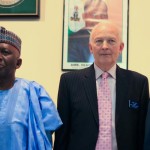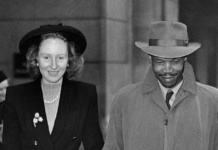
The gathering of people of the business hub in the Banking Hall of the Nigeria High Commission (NHC) on the April, 16 did not betray any inkling of what was in the offing. A good assumption was to think that there was to be some sort of business fair going on that would facilitate some buying and selling. This becomes a half-truth a few hours later. The attendance was quite selected and it was soon quick to discern that these were men and women of purpose who had some pith to their capitalist and commercial outlook. The buffet item was just another incidence that this group was complemented with.
The Business Council for Africa (BCA) had, over time, given grounds for the engagement of the business climate of Nigeria to be put to review. Concerns had been put forward and it is to the credit of both the BCA and the Nigeria High Commission, (High Commissioner and diplomatic lieutenants), that they seized the opportunity to pursue every good intention to establish the climate suitability of the country which has embarked on a high and aggressive commercial drive internationally as a stimulus to the economic revamping of the state.
The hall was parked with a representation across spectre of economic offices and entrepreneurs, investors, interest groups,stake-holders, Nigerians and friends of Nigeria. The stake-hunters were also there. All protocols observed,the business of the day did not just start with explaining the purpose of the event by the BCA but the focus of a listening, as it were, to the Nigerian representative of government, HE Dr. DalhatuSarkiTafida, OFR, CFR react publicly to issues put to the Commission in confidentiality.
A significant note is the partnership that was forged between the BCA and the NHC which was proactive for the mission goal of the BCA and expedient for NHC. It is remarkable that there is a concern to giving the true face of business opportunities in a context of assurance that was facilitated that evening. The usual wave of ‘rumoured’ derogatory news for which the west is usually accused was set aside to getting endorsed opinions and facts. The High Commissioner as well rose up to his simple, matter-of-fact attitude in stating the position of things as they were. This proved most healthy that mutual trust is established and seen as a gateway to successful business relationships. One of the principal staff of the BCA had the opportunity to explain that the stigma of 419 business persons in Nigeria could only be bantered because people don’t take their time to consult appropriately (which BCA does giving referrals) but jump to hear-shot conclusions.
Essentially, Dr. Tafida was to answer the fundamental question: Is it safe and economically feasible to do business in Nigeria? The answers to this stretched into various facets of happenings in Nigeria which the High Commissioner updated one after the other. The concerns were BokoHaram and kidnapping. Flood disasters management, 2013 Budget/Foreign Exchange/Excess Crude Oil (Excro) account, the Central Bank Governor, Federal Road Maintenance Agency (FERMA), Petroleum Industry Bill/NNPC/OPEC, Oil theft and pipeline vandalism, Bill for the State of the Nation address, Power sector, Politics, Task Force on Petroleum Subsidy, State Pardon, and removal of Fuel Subsidy.
It is quite apparent that all these point to the re-assurance of investors and business persons that economic ventures are still viable and the role of government in ensuring infra-structural support and policy stability. The security challenge posed by Boko Haram was proven to be as domestic as international and the fact that international co-operation was already afoot to militate against it. The role of government in neighbouring Mali, and strategic considerations to find solutions without disrupting normal daily activities was receiving attention.
The flood disaster in 2012 found governmental responses in donations anchored by the Flood Recovery Food Production Plan and the release of grains from the Strategic Grains Reserve. The private sector participation and international donors also played a role. While the budget implementation enjoyed a presidential review, a supplementary appropriation bill had been submitted to the National Assembly and slight increases in the nation’s debt portfolio were considered no threat to the economy.
These are just a few of the quality and quantum of the issues discussed. But it is also significant that the BCA was also called to explain their role in Nigeria. The response given by a Director in charge of Nigerian affairs showed that the BCA was genuinely interested in supporting business investments in Nigeria from the diaspora and were quite willing to give logistic and referral support to whosoever asked for it. Among the cream of over 26 business representations that were in sitting, nothing less than 16 of these were already in high profile business interventions in Nigeria and yet were on hand to seek new business interests and collaborations to ensure and assure that business opportunities in Nigeria were still there waiting to be tapped. More pertinent, from a few remarks from the floor, was the need to have a tighter and possibly more co-ordinated support and avenue for such briefings and expositions of the business climate in Nigeria – perhaps a business weather report if you like.
While everyone went away with more than four business cards exchange, it was very apparent that the platform had succeeded and needs to be more frequent with a greater depth of information to service the yearnings of those with the Midas touch and others including Nigerians in diaspora whose upbeat business knowledge is required to lubricate the engines of the economic windmill of the Nigerian state.










